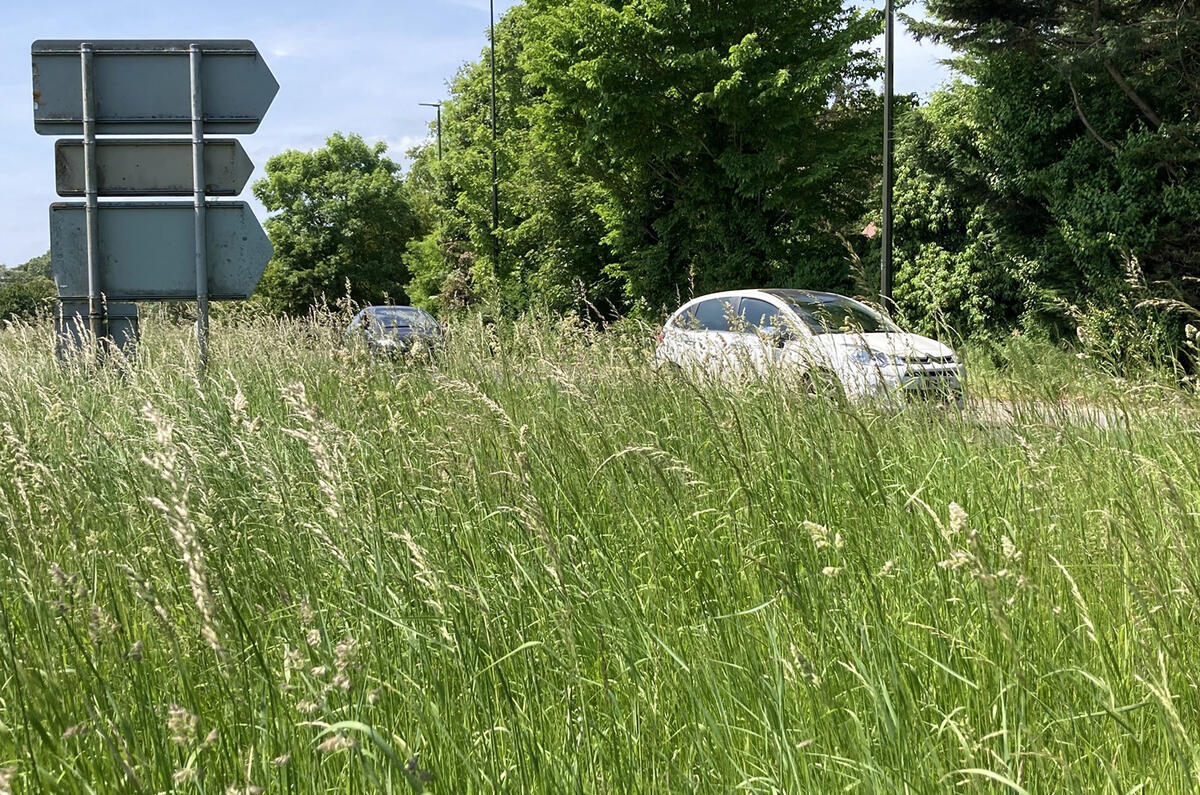No Mow May, the campaign to discourage grass mowing and encourage plant life, has been branded 'No mow may die' by motorists concerned about the reduction in visibility they claim is caused by overgrown grass, flowers and plants on verges.
In June, Colin Dear, a motorist who lives near High Wycombe, Buckinghamshire, went a step further when he mowed a section of verge he claimed had become overgrown, causing several near misses involving cars.
He told Bucks Free Press, "Over the past few weeks, I noticed the grass on the verges along our close was very high. There have been bad accidents in the past where cars haven't been able to see other cars. This year is especially bad and I've seen several near-miss collisions. I was convinced that if I didn't do something about it, someone would get killed."
A spokesman for the council said it recognised the need to maintain visibility for road users but cutting the grass less often benefited wildflowers and pollinators, with the money saved being diverted to road repairs.
Dear isn't alone in voicing concerns about the overgrown state of some roadside verges. For example, motorists writing on Sidmouth's Facebook community page have identified junctions and roundabouts where they claim visibility has been compromised by the council's decision not to mow the grass.
One resident wrote: "Can [the council] do a bit more about the overgrown roadside verges as they are making the roads very unsafe. I realise the trend is to safeguard the habitat of the insects but surely not at the expense of peoples' lives." Another replied: "Perhaps it should be, No mow may… die."
Their concerns are reflected in a survey carried out last year by the RAC. It found that drivers are increasingly unhappy with the standard of grass and foliage maintenance on their local roads [see bar charts, below] and blame the practice for the decline in road conditions.
No Mow May was created by PlantLife, an international conservation charity, to raise awareness about the benefits of allowing plants to flourish. Although they have a duty to maintain roadside verges, councils are permitted to adapt their practices and more than 300 local authorities with bio-diversity strategies have adopted those promoted by PlantLife.
However, Mark Schofield, road verges adviser at PlantLife, says a no-mow strategy alone is not what his organisation advocates.
Schofield said: "In the case of roads, it's about managing verges more sensibly. Dorset County Council was one of the first to adopt the cut-and-collect method of maintaining verges. They cut twice a year in spring and late summer but rather than leaving the waste cuttings to rot, where they encourage fresh growth, they remove them or dump them farther back. The verge becomes less fertile, so the grass grows shorter and requires less cutting."
That's the idea but the outcry from motorists concerned by unmown verges suggests it's not working.
"I'm a motorist, too," says Schofield. "Road safety is key and verge management must reflect this. Tall plants can constitute a hazard for people adjusting their speed to join lanes, pull out of junctions or negotiate corners. The verge must be seen as an extension of the surfaced carriageway and managed to optimise safety but that doesn’t mean our verges can’t play their part on a national scale in helping nature’s recovery."




Join the debate
Add your comment
Wonder what fraction of a fraction of a percent this nonsense is saving/helping?
There are two junctions nearby me where they haven't cut it, and even when stopped you can't see. Stupid. I went and trampled it down so it was safe again.
Also looks scruffy as hell in places - growing over the kerbs, in our village, etc. Wilderness is great - in the wilderness, and not in front of my house (where I've taken to cutting it myself). I'm all for flora and fauna, but this is madness.
These councils have some brass neck....tritely stating that money saved from not cutting verges is being diverted to reparing potholes!!!!!
They should be strung up for such contempt towards Tax payers.
A few potholes have recently been filled in our area, but in each case an operative shoveling some tarmac in the hole and then hitting it with the back of a shovel!
This is hideous waste of our taxes since, inevitably, it only lasts a few weeks before it is scattered all over the road, cracking windscreens and damaging bodywork as the chips are thrown up from tyres.
Do the job once - properly. It saves money in the long run.
Just a thought, government brings up the topic of cost per mile charging for motorists....gven the frightful stste of our roads which we are paying through our noses for....maybe we should be charging the government/council .50p per mile for cumalitave running gear damage?
High plants can hide the road from drivers, but make it clearer for them to reach the cemetary.